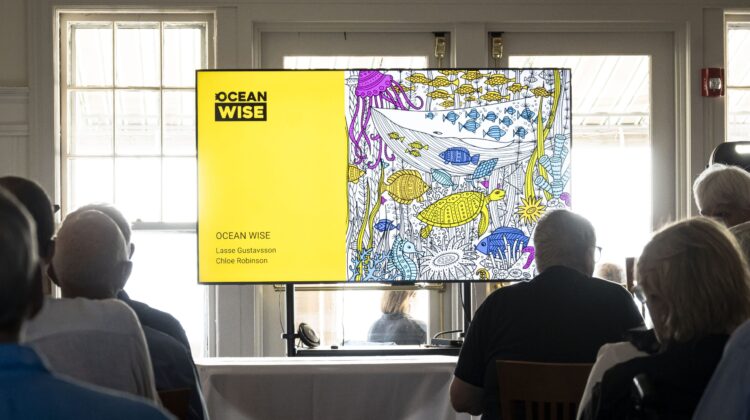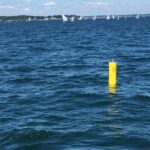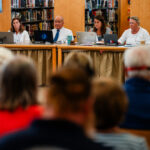On July 8, a blue whale was sighted off of Gloucester on the North Shore. It has been 20 years since the last sighting of the largest animal in the world in these waters. The sighting occurred with perfect timing to welcome Ocean Wise, a non-profit organization out of Vancouver that focuses on global ocean conservation, to Marblehead to educate and discuss ocean sustainability.
Marblehead’s Corinthian Yacht Club, a leader in sustainability measures in boating, hosted President and CEO Lasse Gustavsson and Director of Whales Initiative Dr. Chloe Robinson to share what their charity does and how we can learn from and contribute to Ocean Wise’s mission.
Sustainable Marblehead board member Rob Howie, and past commodore of the club, opened the talk and introduced the Ocean Wise guests.
Gustavsson, an international global environmentalist and deep sea scientist, was first to speak from Ocean Wise.
“Our job is to turn research and knowledge into practical action that benefits the ocean. For us, addressing solutions that are scalable on climate, on overfishing, and on plastic pollution is core to what we do,” Gustavsson said.
He added that there are a lot of protesters, a lot of research, and no shortage of different initiatives except for organizations doing things.
“That’s what’s missing. That’s our niche, we are the doers of the ocean conservation movement. The focus is on making a difference in the water,” Gustavsson said.
Looking to expand their initiatives, Ocean Wise has built a board of four American directors with two on the east coast. During this visit, Gustavsson and Robinson have been to Woods Hole and met ocean entrepreneurs in Boston.
“And now we are here. We are looking for friends and collaborators, trying to find partners for Ocean Wise and hopefully come here and add value with the expertise we have,” Gustavsson said.
Gustavsson went on to explain many of the reasons we need the ocean.
“The ocean generates more than 50% of the oxygen in the world. It provides food for three billion people around the world and the ocean economy is somewhere between three to six trillion US dollars a year. But the ocean needs us as well. The climate crisis is hitting harder. Nearly 80% of the world’s fisheries are already overfished or collapsing. Forty to sixty percent of the world’s kelp forests are gone. We are releasing 26 billion pounds of plastics into the ocean every year” Gustavsson said.
Another important part of Ocean Wise’s mission is educating and empowering young people. Ocean Wise provides programs in Canada as well as online programming that touches 92 countries.
Ocean Wise also collaborates with Girl Up, a leadership training network for young women with 250 branches around the US, which did not have an environmental program.
“Now we have our young women working with this organization doing ocean conservation and climate work with them. Bringing young people into the space is not only about building leadership for tomorrow, but it’s also about leadership for today. We hope that young people go through our educational programs and dedicate their professional life to the ocean,” Gustavsson said.
Gustavsson then passed over the talk to his colleague, Dr. Robinson, to discuss what the charity has been executing in terms of whale protections.
Robinson shared that she’s really excited about the whale work they do on Canada’s west coast and how the work they do here could inspire action not just on the east coast, but around the world.
“Our vision is safer, more plentiful water for whales. We look to protect whales from two of the biggest threats they face; ship strikes and lack of food. I am going to give an overview of our work and one of our conservation tools, our whale report alert system. It’s a real-time system that alerts mariners when whales are in the vicinity to help prevent ship strikes,” Dr. Robinson said.
Although the fatal ship strikes are typically a combination of ferries, tankers, and cargo ships, there are still a lot of strikes with recreational boaters, she said. Ocean Wise has sent out 14,500 alerts to mariners to date this year; up 230% from this time last year.
“This tool has been a great success,” Dr. Robinson said.
With drones, Dr. Robinson’s group can collect images of the whales heads to measure as a way of seeing if they have enough food. This enables her group to provide feedback to the government to protect whales from starvation.
“We are giving the west coast as a case study and how this work could be applied to the east coast to help protect the North Atlantic Right Whale,” Dr. Robinson said.
Ocean Wise’s technology and advancements in understanding of how to find whales and how to leverage local communities of observations of whales could be so much more effective by working together with others was the overall message.
To learn more about Ocean Wise visit their website at www.ocean.org.




